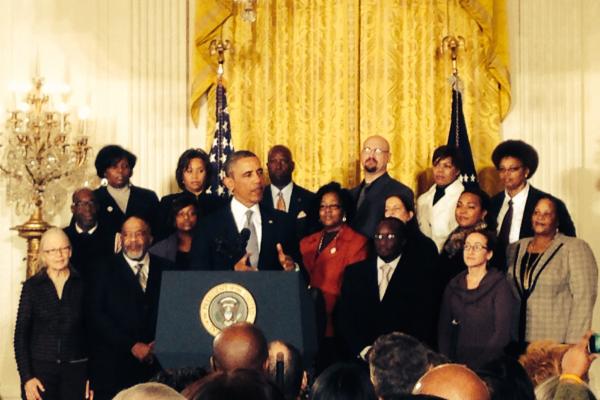"Preach the Gospel at all times, and if necessary, use words" is a quote widely attributed to St. Francis of Assisi. It also seems to be the motto of Pope Francis. Instead of just talking about abstract doctrines, he consistently lives out his beliefs in public ways that have grabbed the world's attention. His example of humility, compassion, and authenticity resonate powerfully in Washington, where cynicism is rampant, pride remains even after the proverbial falls, and an ideology of extreme individualism has overtaken a significant faction within our politics.
The Pope's words and deeds fascinate us because they are genuine and selfless. How could a leader of global significance spend time cold calling pregnant women in distress, kissing the feet of young Muslim inmates, or embracing a disfigured man? What sorts of values motivate such behavior? These stories touched our hearts, but they appeared irrelevant to our politics.
Then the Pope started talking about our wallets, which, according to a several commentators on the far right, instantly transformed him into a threat to capitalism itself.
After 36 years of serving churches as a pastor and consultant, I came to a startling conclusion the other day.
Not startling to you, perhaps. I might be the last person to get the memo. But the conclusion drew me up short.
My conclusion: Religion shouldn’t be this hard.
No doubt about it, Pope Francis is generating the kind of Internet buzz and sky-high Q Scores that brand managers can only dream of. But is the pontiff becoming a victim of his own good press?
The Vatican once again had to dispel media reports that went well beyond what Francis actually said, as his spokesman formally denied that the pope had signaled an openness to same-sex unions in a recently published conversation with leaders of religious orders.
During the November discussion with leaders of the Jesuits, Franciscans and others, Francis said they needed to engage “complex” situations of modern life, such as the prevalence of broken homes and the growth in gay couples rearing children.
Abba Moses asked abba Sylvanus, “Can a person lay a new foundation every day?” The old man said, “If they work hard, they can lay a new foundation at every moment.”
What then of skill? Virtuosity?
(I’m thinking a lot about skill, virtuosity, and the problems it presents. What good is it?)
I often wonder what it would be like to take pride in something rather than simply being prideful. It’s a trick, to say the least, to sort out the difference. To recognize skill, to possess the intention to do something well for the sake of doing something well treads that line. I wonder about the virtue of being good at something — of recognizing one’s skill and then situating that skill in some way that serves not one’s own agenda, one’s own ego, but that benefits the common good.
How do we know our own place in the commons? Is this even possible?
It’s a new year, and Congress is back in session.
One of the top issues expected to be debated in 2014 is a hike to the federal minimum wage. 13 states have instituted wage increases. President Obama has supported raising the minimum wage throughout his presidency. Most recently, he shared his approval of new legislation proposed by Sen. Tom Harkin and George Miller (D-Calif.) that would raise the minimum wage to $10.10, up from it’s current $7.25.
Critics of the Harkin/Miller bill are quick to decry any wage increase. The usual arguments are trotted out to combat progressive pay for low-wage earners. Here are five commonly perpetuated myths about minimum wage. Hopefully, their exploration will shed a more accurate light on this contested issue.
The other day I observed a Twitter exchange between Pope Francis and Miroslav Volf.
Pope Francis (@Pontifex) Tweeted:
“God does not reveal himself in strength or power, but in the weakness and fragility of a newborn babe.”
To which Miroslav Volf (@MiroslavVolf) replied:
“@Pontifex How true! And yet the babe grew and taught with power and authority, and the crucified one was raised from the dead in glory.”
Since moving to the Navajo reservation more than a decade ago, I have done much thinking, studying, praying, and reflecting on the dynamics between power and authority. And God has given me a few insights over the years. So when I read these tweets I had an instant desire to jump in and be a part of the discussion.
I stood in line and waited until they called my number.
“Neeeext,” the woman behind the counter called!
The woman put out an energy that dared anyone to cross her, challenge her, even speak to her. She gave me a pile of papers to fill out “over there,” she waved her hands dismissively in the general direction of all the other losers sitting in rows of old school desks — the kind where the chair and the desk are attached. They were all fully engrossed in one task: filling out their unemployment insurance applications. I joined them.
Of course we weren’t losers, but it felt like we were. We were grown adults. We represented many races: white, black, Latino, and Asian. We represented a small fraction of the sea of people who were out of work at the height of the economic crisis. If you had come to us only weeks before we were school teachers and firemen, opera singers, Wall Street brokers, and justice advocates (like me). But now we were all numbers, experiencing the same humiliating moment together.
But, how much more humiliating it would have been to be thrown out of my apartment? How much more dehumanizing would it have been to become homeless or go without food?






